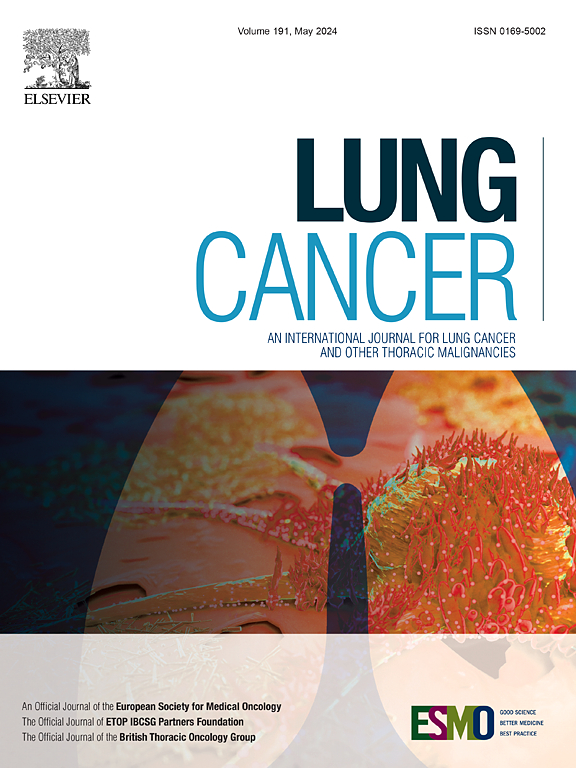Beyond environmental risk: Genetic insights into lung cancer susceptibility through whole exome analysis
IF 4.5
2区 医学
Q1 ONCOLOGY
引用次数: 0
Abstract
Background
unlike familial non polyposis colorectal cancer (Lynch syndrome) and familial breast cancer, no genes have been confidently associated with familial lung cancer with the exception of the EGFR and the TP53 genes. Germinal Pathogenetic Variants (GPV) in these two genes account for 0.34–0.9% and 0.8 % lung adenocarcinoma, respectively.
Objective
the aim of this study was to identify rare genetic variants associated with higher risk of developing lung cancer.
Methods
we performed exome sequencing in the germinal DNA of 16 patients who had a positive familial history of lung cancer: 14 patients had lung cancer at enrollment whereas 2 patients developed cancer during the course of the study.. Two families had two affected relatives (mother and daughter and two sisters).
Results
we identified rare clinically significant variants and VUS (Variant of Unknown Significance) in five well known cancer genes (POLE, PDGFRA, RTEL1, HNF1A and MITF) in five patients. One patient carried three variants and was exposed to environmental risk factors as smoking and asbestos. Common suscetibility variants in known cancer genes were also identified.
We also identified additional potentially clinically relevant rare variants in other genes not previously associated to lung cancer. These genes include HGS, NME4, HAPLN1, ATMIN, CEACAM, MPEG1, USP4, TP53BP2, ERAP1, TNFAIP8L3, CASP1, MCC, SERPINA3, VIRMA, FOXK2, DNAH8, RASA2, GLI3.
Conclusions
several lines of evidence suggest that these genes are of potential clinical impact in lung cancer even though they have not been correlated with lung cancer in the OMIM database or other genetic databases. Therefore, these genes deserve further investigations: segregation analysis, enlarged cohorts and in vitro/in vivo studies could help to clarify their role in lung cancer.
超越环境风险:通过全外显子组分析对肺癌易感性的遗传见解
与家族性非息肉性结直肠癌(Lynch综合征)和家族性乳腺癌不同,除了EGFR和TP53基因外,没有基因与家族性肺癌有确切的关联。这两个基因的生发致病变异(GPV)分别占肺腺癌的0.34-0.9%和0.8%。目的本研究的目的是确定与肺癌高风险相关的罕见遗传变异。方法对16例肺癌家族史阳性患者的生发DNA进行外显子组测序,其中14例患者在入组时患有肺癌,2例患者在研究过程中发生癌症。两个家庭有两个受影响的亲戚(母女和两个姐妹)。结果我们在5例患者中发现了5个已知癌症基因(POLE、PDGFRA、RTEL1、HNF1A和MITF)的罕见临床显著变异和未知意义变异(VUS)。一名患者携带三种变体,并暴露于吸烟和石棉等环境风险因素中。已知癌症基因中常见的易感变异也被确定。我们还发现了其他与肺癌无关的基因中其他可能具有临床相关性的罕见变异。这些基因包括HGS、NME4、HAPLN1、ATMIN、CEACAM、MPEG1、USP4、TP53BP2、ERAP1、TNFAIP8L3、CASP1、MCC、SERPINA3、VIRMA、FOXK2、DNAH8、RASA2、GLI3。结论:尽管在OMIM数据库或其他基因数据库中尚未发现这些基因与肺癌相关,但多项证据表明,这些基因在肺癌中具有潜在的临床影响。因此,这些基因值得进一步研究:分离分析、扩大队列和体外/体内研究可以帮助阐明它们在肺癌中的作用。
本文章由计算机程序翻译,如有差异,请以英文原文为准。
求助全文
约1分钟内获得全文
求助全文
来源期刊

Lung Cancer
医学-呼吸系统
CiteScore
9.40
自引率
3.80%
发文量
407
审稿时长
25 days
期刊介绍:
Lung Cancer is an international publication covering the clinical, translational and basic science of malignancies of the lung and chest region.Original research articles, early reports, review articles, editorials and correspondence covering the prevention, epidemiology and etiology, basic biology, pathology, clinical assessment, surgery, chemotherapy, radiotherapy, combined treatment modalities, other treatment modalities and outcomes of lung cancer are welcome.
 求助内容:
求助内容: 应助结果提醒方式:
应助结果提醒方式:


